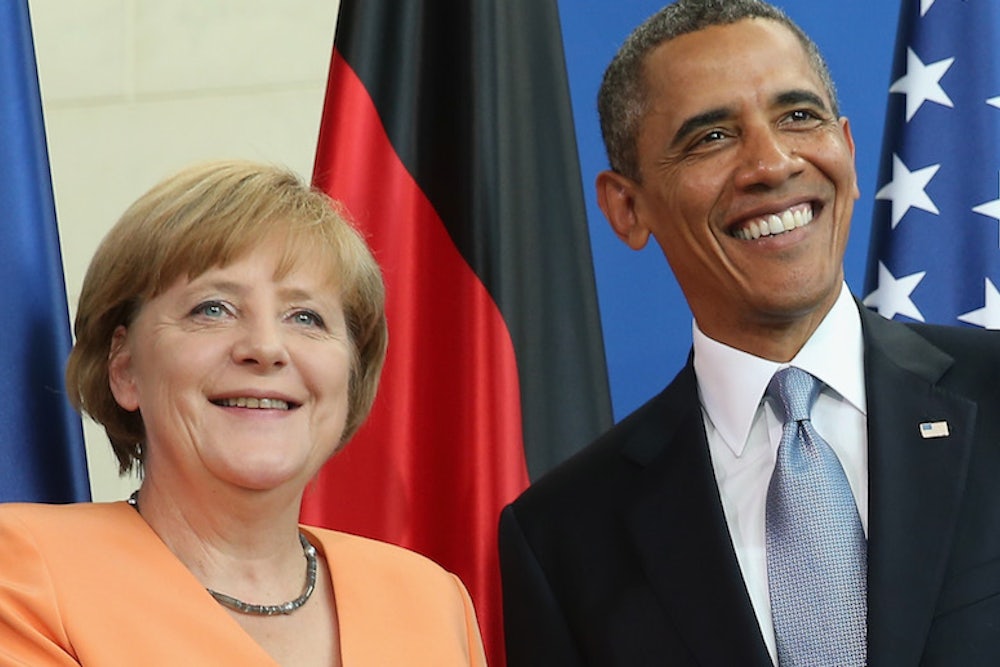Count me as very skeptical about the suggestions in recent days that neither the White House nor the congressional intelligence committees knew about NSA collections against leaders in allied countries.
I have a hard time believing that the President in his many hundreds of intelligence briefings—scores of which surely involved intelligence about allied leaders in run-ups to various diplomatic and political meetings—did not know that some of the information was gleaned through collection against the leaders themselves. (I am not saying that the White House is lying about what the President knew—only that its statement about the President’s ignorance is extraordinary, and that I suspect that someone in the White House knew.) If, as Senator Feinstein said yesterday, the President “was not aware Chancellor Merkel’s communications were being collected since 2002,” then it is indeed (as she said) “a big problem”—mainly for the President’s credibility as chief Executive. For this collection outside the United States against a non-U.S. person is done pursuant to Executive Order 12,333.
As for Congress: The NSA, like all intelligence agencies, has a duty under 50 U.S.C. 413a to “keep the congressional intelligence committees fully and currently informed of all intelligence activities, . . . including any significant anticipated intelligence activity and any significant intelligence failure.” The intelligence community takes this duty seriously because it has been burned in the past for underreporting and because it gets political and legal cover (and comfort) from reporting.
And indeed, Feinstein does not claim that the Senate Intelligence Committee was unaware of the collection programs in question. She says, rather, that the Committee “was not satisfactorily informed” (my emphasis). That sounds like a bottom-covering formulation to me. The NSA and the intelligence community generally has a lot to report and they send the committees a lot of material, highlighting what they deem most significant and offering to provide more information or briefing as requested. I might be proved wrong, of course, but I expect that what we will learn in the coming days and weeks is that the NSA (or the DNI) did report these collection activities, and that the committees did not probe further, probably because—under the assumption that the activities would remain secret—they implicitly agreed with, or were not worried about, what was going on.
The reason that the committees likely did not probe further is that its oversight of U.S. surveillance activities is geared primarily to the politically and legally controversial programs that touch the U.S. homeland or U.S. persons. The Committees naturally focus less on what the intelligence community collects abroad (except to the degree that collection relates to covert actions.) As the Washington Post reported a few weeks ago in connection with the story about collection of email addresses abroad:
Sen. Dianne Feinstein, the California Democrat who chairs the Senate Intelligence Committee, said in August that the committee has less information about, and conducts less oversight of, intelligence gathering that relies solely on presidential authority. She said she planned to ask for more briefings on those programs.
“In general, the committee is far less aware of operations conducted under 12333,” said a senior committee staff member, referring to Executive Order 12333, which defines the basic powers and responsibilities of the intelligence agencies. “I believe the NSA would answer questions if we asked them, and if we knew to ask them, but it would not routinely report these things, and, in general, they would not fall within the focus of the committee.”
We will soon learn what NSA did and didn’t report, and in what form, but as I said, I suspect that the now-controversial collection activities were conducted under E.O. 12,333 and reported in some form, but were not deemed oversight priorities by either NSA or the committees. This might not speak highly of intelligence committee oversight, and it might illustrate that NSA and the intelligence community more broadly are engaged in too many activities for the committees to adequately engage. But I doubt that the NSA or DNI engaged in malfeasance, which is what some of the stories, and the tone of Feinstein’s letter, and the White House’s bottom-covering, suggests.
UPDATE: No sooner had I publish this post than I read in the L.A. Times a story I had missed that suggests the White House did indeed know and approve the collections in question:
The White House and State Department signed off on surveillance targeting phone conversations of friendly foreign leaders, current and former U.S. intelligence officials said Monday, pushing back against assertions that President Obama and his aides were unaware of the high-level eavesdropping.
Professional staff members at the National Security Agency and other U.S. intelligence agencies are angry, these officials say, believing the president has cast them adrift as he tries to distance himself from the disclosures by former NSA contractor Edward Snowden that have strained ties with close allies.
There is a lot more to learn here.
This story was cross-posted at Lawfare. Jack Goldsmith, a contributing editor, teaches at Harvard Law School and is a member of the Hoover Institution Task Force on National Security and Law.
